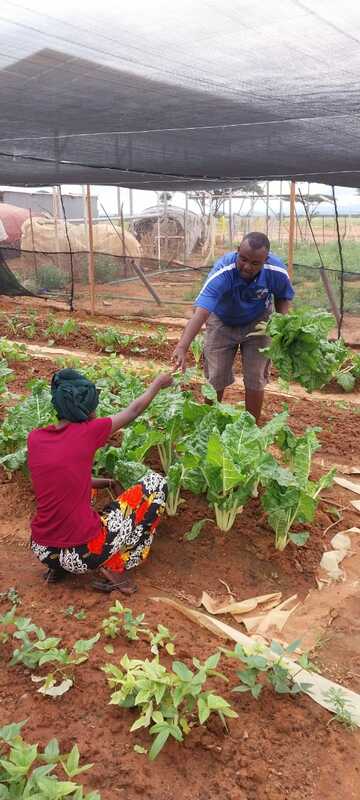PlantVillage Champions for Sustainable Irrigation to Mitigate Climate Change and Increase Food
Posted on
Kenya has an irrigation potential of about 1,350,000 acres according to the National Irrigation Authority. Out of these, only about 500,000 acres of irrigation have been developed. With improved water harvesting and water storage facilities, the current irrigation potential could increase to about 1.9M acres.
The population relying on agriculture for their livelihoods is about 75%. Irrigation is crucial to Kenya's agriculture sector, as it provides a reliable water supply for crops throughout the year, even in Arid and Semi-arid Lands (ASAL) areas. However, unsustainable irrigation practices have led to the depletion of water resources, soil degradation, and reduced agricultural productivity.
To ensure smallholder farmers in ASAL areas practice sustainable irrigation, PlantVillage has championed various irrigation measures to ensure food security and enhance agroforestry practices. The organization also aims to transform tens of thousands of hectares from bone-dry sand to vegetable-sprouting soil.

In March 2023, the organization constructed its first underground capillary wick irrigation system at the Ririma borehole in Marsabit County (Northern Kenya), to grow vegetables and combat drought and famine. The project has since become a success with the first harvest containing 30Kgs of vegetables and the second harvest 53Kgs.

“The capillary wick irrigation works well for this project, it is easy to manage since we normally connect taps to the borehole which allows water to flow to the whole system,” said Fofen Lawrence, PlantVillage Research Extension Officer. He added that among the vegetables harvested were Kale and Spinach which is done in intervals of two weeks.

Fofen also stated that the project has brought about numerous benefits to the community including, reducing malnutrition: availability of vegetables has provided the community with a balanced diet and acted as a source of income through providing employment opportunities. “To enable adequate supply of food in the region farmers need to set up kitchen gardens around their households and purify used water for irrigation,” he observed.
To ensure the organization can meet its goal of planting one million trees in the year 2023, PlantVillage through the Agroforestry team began an experimentation phase using drip bottles to boost the survival rate of young seedlings in harsh climatic conditions.

“We aim to mitigate climate change by planting as many trees as possible, therefore to sustain that there was a need of introducing drip irrigation using bottles to our farmers to enable growing and survival of trees during dry seasons,” said Kelvin Moranga, Agroforestry Officer.
He noted 1,560 tree seedlings were planted during the experimentation phase early this year and currently the survival rate is being determined.
“Drip irrigation using bottles is crucial when planting trees in ASAL areas or during dry seasons, it improves seedlings survival rate, is easy to manage and increases water-use efficiency by the seedlings hence improving tree cover,” he said.
Moranga stated that there is a need for farmers to be trained further on managing drip bottles to ensure the scaling up of the project.
Michael Saha, a farmer in Rabai sub-county is among the farmers who practice sustainable irrigation in Kilifi County. The farmer irrigates a half-acre vegetable farm using drip bottles with his main water source being tap water, he also conserves rainwater using a water pan.

“I decided to use drip bottles on the upper side of the farm where I Plant Okra because the land is sloppy and the upper part does not hold enough water,” he said. Saha noted that drip irrigation is beneficial because it saves water and ensures water gets to the root of the crops, therefore, boosting their growth.
“Before I embraced the drip irrigation technique the profit from selling vegetables used to be Ksh 500 but since February this year I have harvested twice and gotten a seasonal profit of Ksh 1,410 and Ksh 3,700 respectively,” he observed. He further encouraged farmers in the area to practice irrigation through drip bottles to ensure crop productivity since the area is dry.
PlantVillage is currently equipping a borehole in Garashi, Magarini sub-county that will enable 30 households to cultivate high-value crops through irrigation. The organization is also planning to help farmers construct water pans to aid in water conservation.
"Irrigation is key to not only surviving climate change but actulally thriving" said David Hughes, founder of PlantVillage. "We need more experiments like these to move the needle and we are so grateful to donors like Hopper Dean Foundation who have enabled this"